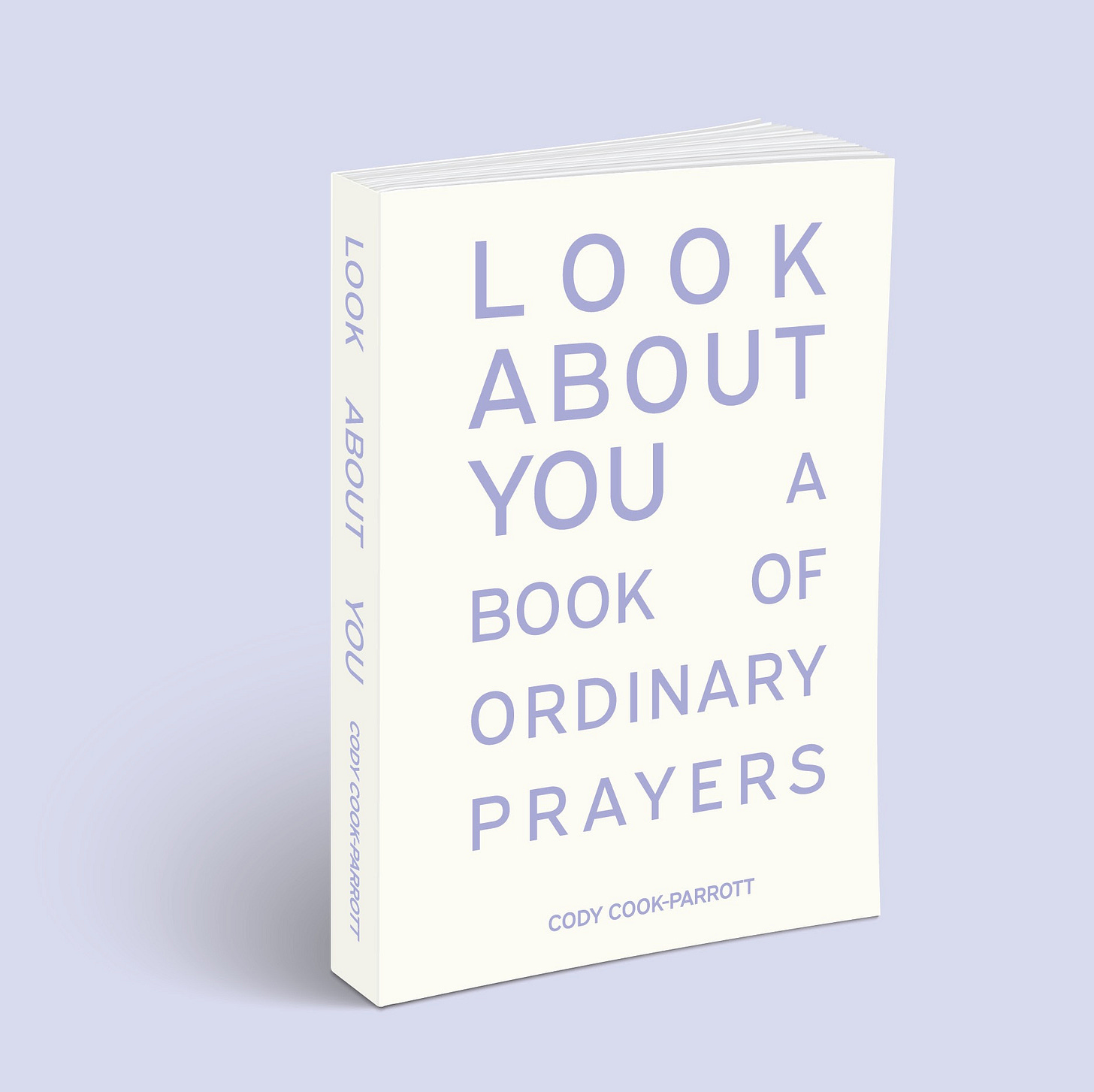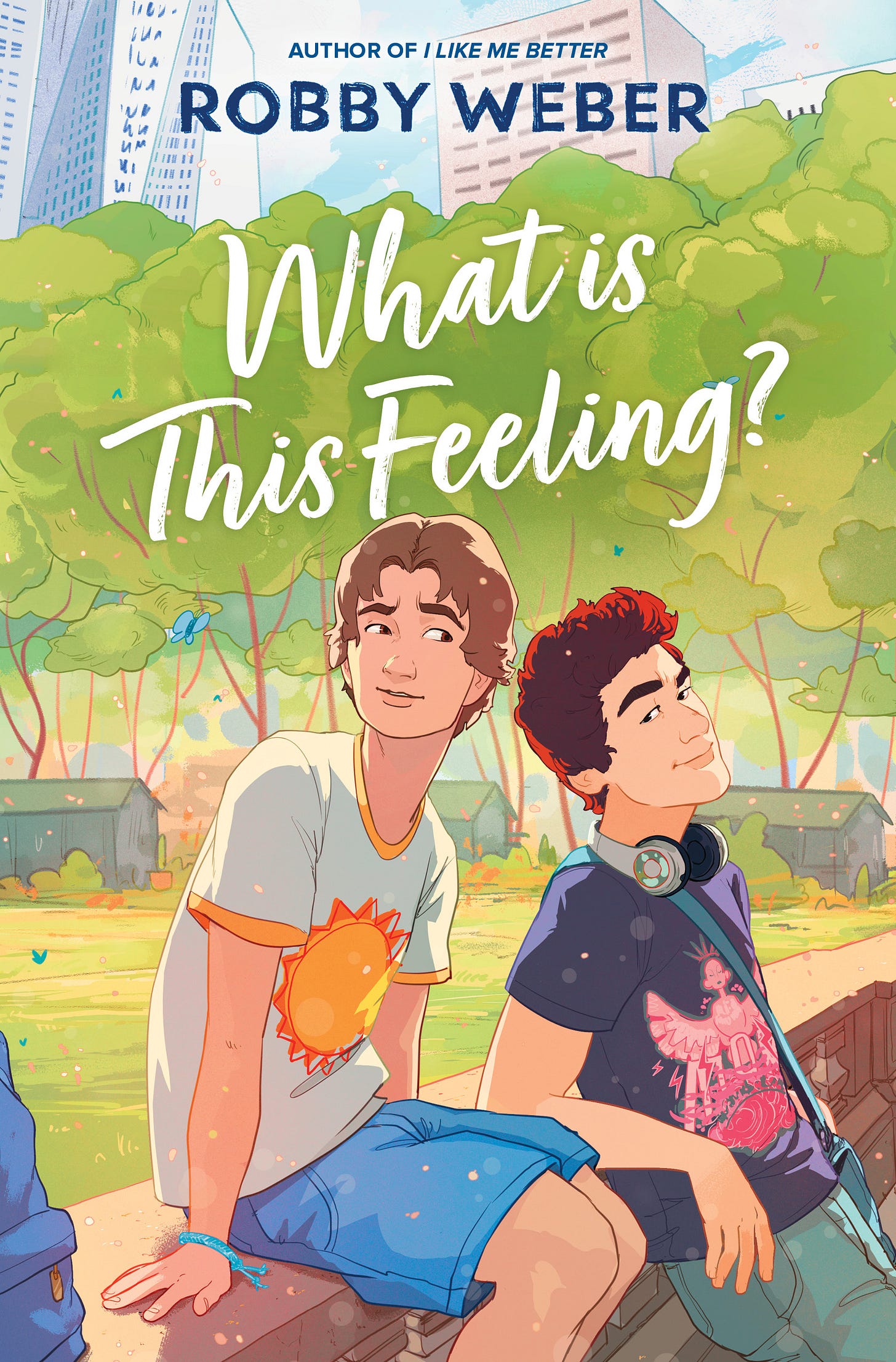Recently, I came up with the title for one of my favorite writers’ books. It’s coming out in November. Just look at this gorgeous cover design:
In the spring, Cody Cook-Parrott announced that they were serializing a collection of daily prayers on Substack with the goal of eventually turning the project into a book. I immediately became a subscriber. I’ve always been drawn to the way Cody writes about spirit—they’re like the millennial Melody Beattie, whose meditations book The Language of Letting Go is something I’ve read almost every day for the past two years.
Originally, Cody’s prayer project was called Ordinary Practice. But last month, they sought title input from subscribers.
And I immediately knew what Cody should title this book.
I’ve taken several classes with Cody. One thing I’ve noticed them repeating in class is the state motto of Michigan, Cody’s home state. It goes like this:
“If you seek a pleasant peninsula, look about you.”
I’ve never been to Michigan. But since I am also peninsula-bred (Florida!), the motto stood out to me right away. I adore its sentiment: the pleasant is always present, so long as we look about ourselves.
And for a book of prayers that prompt its reader to look about? It felt exactly right.
Cody messaged me right away, saying they wanted to use the title and checking to see if that felt good to me. Of course it did! In fact, nothing really could’ve felt better than that. I felt like I’d named someone’s child.
Some book titles, like Look About You, strike like lightning. Other times, titling a book is like pulling teeth. But I’ve found that most titles come with an air of ambivalence. Anyone can land on a title, but so rarely do titles come with that genius, just-right feeling. Instead, most of them feel like working titles, even when we’re well past the working stages.
But perhaps most books can do with a title that’s simple.
I’ve been thinking about my own journey with titles. Originally, my novel, which is about a woman who treats a houseplant as her child and makes YouTube videos about it, was titled Plant Parenthood.
I had faith that this title would catch a literary agent’s eye. But when I first queried agents with my sample pages, one agent (who ended up becoming my agent!) said that one thing she would change about my initial pitch was—you guessed it—the title.
Her reasoning? Planned Parenthood is a sacred institution. And if I’m going to use it as a joke, I better have a good reason.
She was right. If the novel had been about women’s health or abortion access, perhaps it would’ve earned that title. But ultimately, it just wasn’t the right fit.
So I changed the title to: Plant Mom. And I really like this title, even though it couldn’t be more simple. I feel like it has a capitalistic edge: I’ve seen the words “plant mom” stitched on throw pillows (see below!) and printed on coffee mugs. And since my novel is, in large part, about the absurdity of influencer culture, an influence-y title makes a lot of sense.
Come to think of it, most of the books I love don’t have catchy titles. Most of the titles I rounded up in my summer book roundup a few months ago are fairly subdued: Annie Bot. Worry. Lessons for Survival.
Some titles, like Miranda July’s All Fours (recently longlisted for the National Book Award!), really catch my eye. But for the most part, simple seems to sell.
TIPS FOR THE TITLE CHALLENGED
Here are a handful of ideas for titling your work.
Grab a highlighter, print out your work, and go to town. Don’t overthink it: look through your writing with an objective-as-possible eye and highlight any words or phrases that jump out at you. These could be title contenders.
Make a word cloud. Copy and paste your document into a word cloud generator. Not only will you see the most prevalent words in your project (which is great for helping you remember to edit out those pesky overused words, like “just” or “really”), but the word cloud may also throw off some interesting juxtapositions that’ll help you see your work from a fresh angle.
When in doubt, outsource. Ask friends, family, perfect strangers. Give them a brief synopsis or let them read the first page. Ask them what they’d title it, and tell them there are no wrong answers. This approach sure worked out for Cody with Look About You!
Still no strokes of brilliance? Don’t be afraid to keep it simple. Maybe your working title is better than you think!
SHARE YOUR TITLE TIPS
How do you title your work? What’s the best title you’ve come across in your reading life lately?
JACKSONVILLE FRIENDS!
This Saturday, September 21 at 6pm, I’ll be interviewing YA author Robby Weber live onstage at The Bookmark in Neptune Beach. No one writes queer joy like Robby Weber! 🏳️🌈
I’ll be asking Robby questions about his brand new book, What is This Feeling? Hope to see you there!
Happy writing (and titling),
Hurley







This was such a good read! It took us two years to title our comedy craft book before we landed on INSIDE JOKES (out in 2026). We had to try all the techniques you mentioned here, and asked a lot of people. The proposal went out with a totally different (and very long) title that never felt right to us.
Giving a full poetry collection manuscript is such a challenge! Sometimes you can use the title of one of the individual poems, but in my experience this can put too much weight on that one poem and skew perceptions of the overall book. I tried the word cloud method with my second manuscript and the juxtaposition of the two words that appeared most frequently overall really felt right for the working title of the book-to-be. So thank you for that!